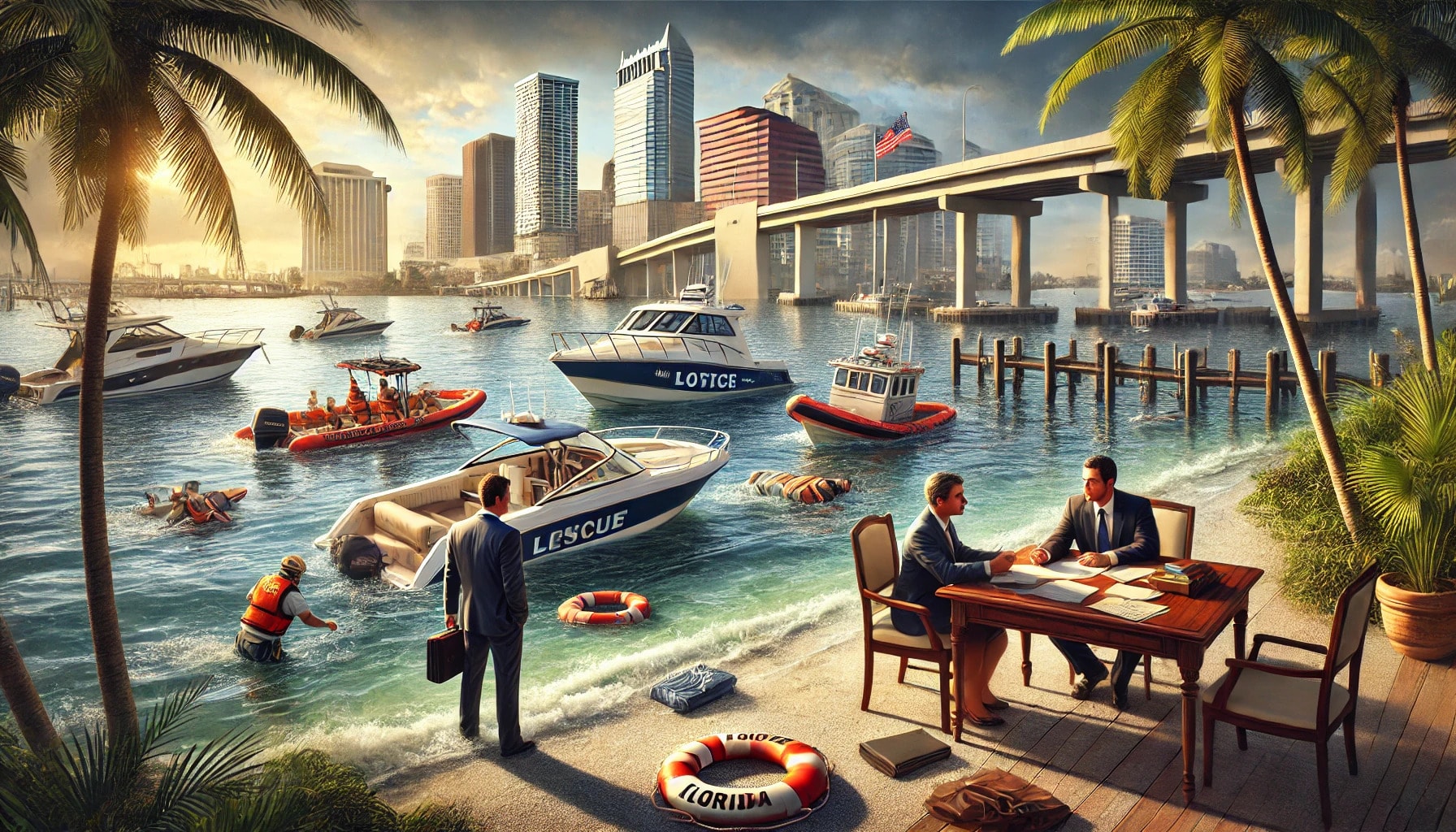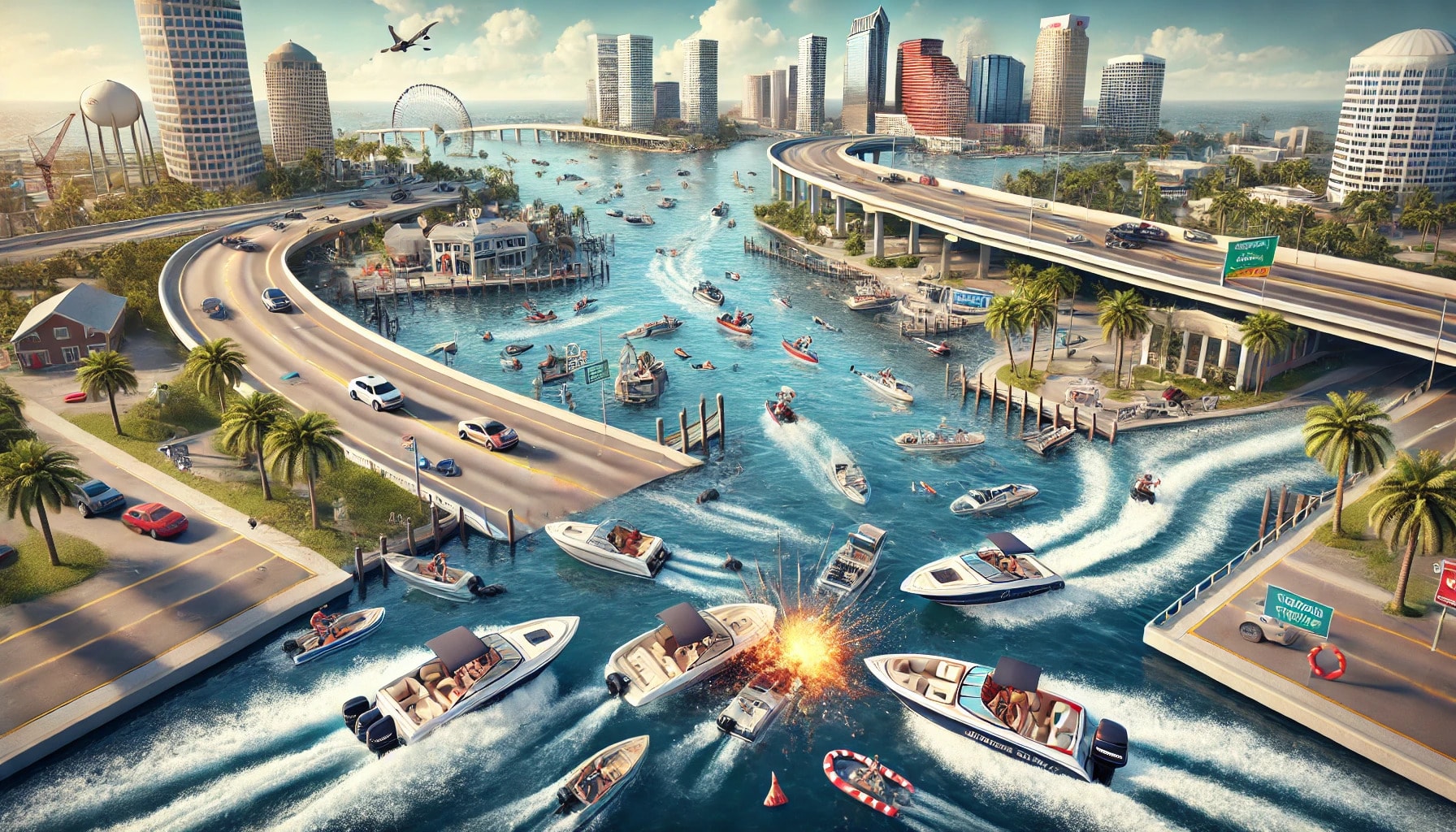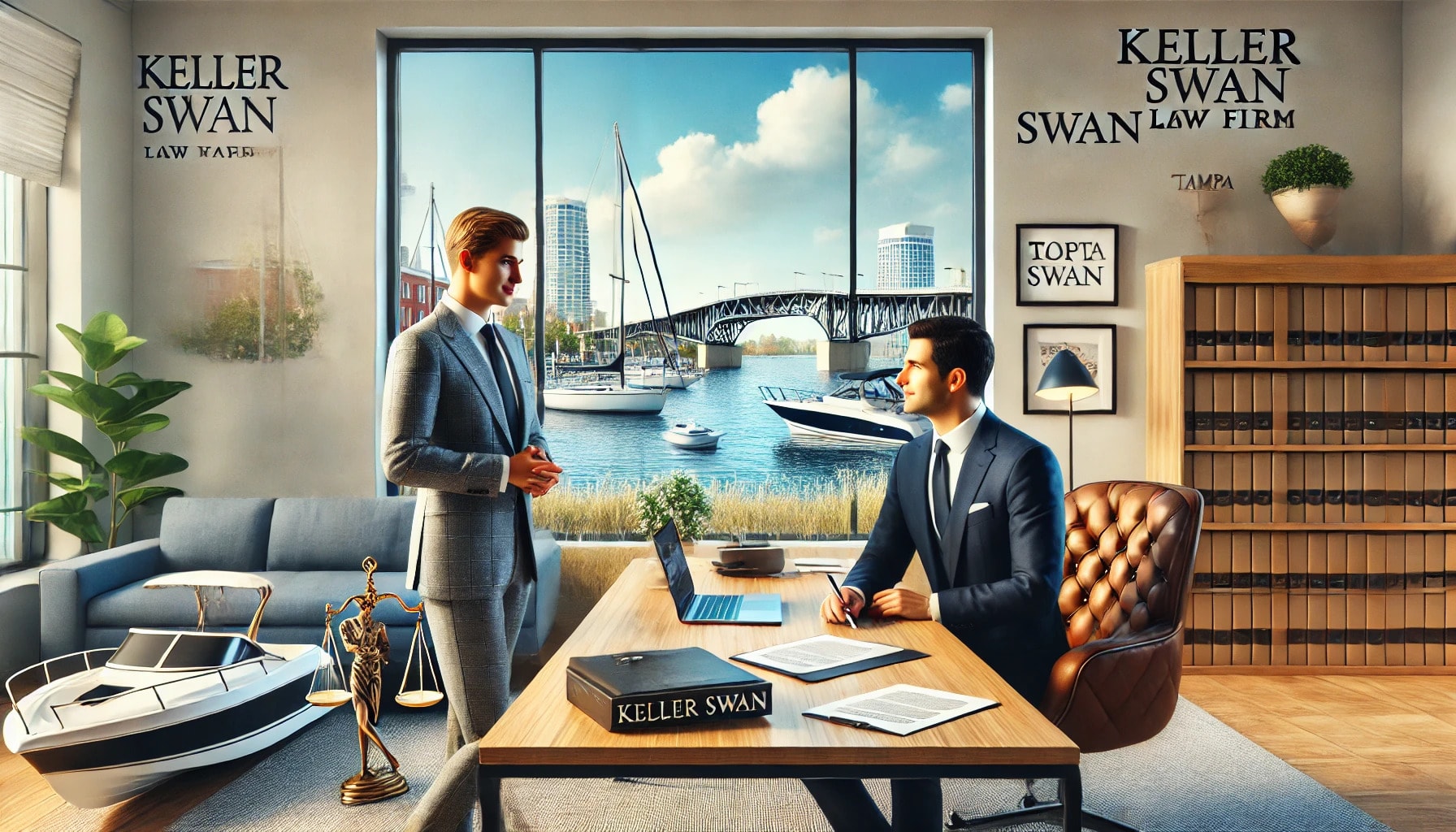Boat Accidents in Tampa, Florida: Laws, Statistics, and Notable Cases

Tampa, Florida, is a hotspot for recreational boating due to its proximity to the Gulf of Mexico, vibrant marinas, and scenic waterways. Unfortunately, this increased activity also increases the risk of boat accidents, ranging from minor property damage to devastating incidents involving serious injuries or fatalities. Understanding the legal landscape, accident statistics, and notable cases surrounding boat accidents in Tampa, Florida, is essential for all boaters. This comprehensive guide explores the legal framework, 2023 statistics, and a significant case from the past decade to shed light on boating safety and accountability.
With popular routes near landmarks such as the Courtney Campbell Causeway, Howard Frankland Bridge, and Tampa Bay’s sprawling waterways, these boating incidents are often caused by operator error, equipment failure, or unpredictable weather. Authorities like the Florida Fish and Wildlife Conservation Commission and the Coast Guard are critical in investigating accidents and ensuring compliance with safety regulations.
Tampa’s Boat Accident Laws and Legal Framework
Boat accidents in Tampa, Florida, are governed by a combination of maritime and Florida state laws. This dual framework outlines safety standards, operator responsibilities, and the legal consequences of negligence. Boaters born on or after January 1, 1988, must carry a boating safety education ID card to operate motorized vessels, ensuring they understand the rules of navigation and safety requirements.
Operant inattention, inexperience, and inappropriate speed in Florida contribute to approximately 70% of personal watercraft accidents. Strict safety regulations mandate the use of life jackets, fire extinguishers, and navigation lights, while larger vessels must carry visual distress signals when operating offshore. Florida’s Boating Under the Influence (BUI) laws further protect boaters, penalizing operators with a blood alcohol concentration (BAC) of 0.08% or higher. The Florida Fish and Wildlife Conservation Commission regularly enforces these rules to reduce accidents and improve safety on Tampa Bay’s waterways.
Common Causes of Boat Accidents in Tampa

Boat accidents arise from various factors, often involving negligence or unsafe conditions.
Operator error, including distracted boating and failure to maintain a proper lookout, is a leading cause of boating incidents in Tampa. Excessive speed and inexperience also contribute to collisions, particularly on crowded waterways like those near the Howard Frankland Bridge or Courtney Campbell Causeway.
Environmental factors like sudden storms or rough waters increase the risk of accidents like capsizing or falling overboard. Equipment failure, whether due to manufacturing defects or inadequate maintenance, can lead to catastrophic incidents like fires or explosions. Alcohol use remains a significant concern, as intoxicated operators often lack the judgment and reaction time needed to navigate safely.
2023 Statistics: Boat Accidents in Tampa
In 2023, Tampa reported 32 boat accidents, highlighting the risks associated with its busy waterways. These incidents ranged from minor property damage to severe injuries and fatalities. Collisions between vessels or with stationary objects accounted for most accidents, often caused by operator inattention or failure to follow navigation rules. Areas near the Courtney Campbell Causeway and Howard Frankland Bridge were particularly accident-prone due to high traffic and challenging conditions.
Capsizing incidents were also common, often attributed to vessel overloading or improper weight distribution. Falls overboard resulted in several serious injuries and fatalities, with contributing factors including alcohol use and rough waters. The Florida Fish and Wildlife Conservation Commission emphasized the importance of safety measures such as life jackets and boating education to reduce these statistics in the future.
Liability and Negligence in Boat Accident Cases
Determining liability in a boat accident requires proving negligence by one or more parties. Negligence occurs when a boat operator, manufacturer, or other party fails to exercise reasonable care, leading to an accident. For example, an operator who ignores navigation rules or operates under the influence may be held liable for injuries or damages. Similarly, a manufacturer can be held accountable if defective equipment causes a crash.
Florida’s comparative negligence laws can reduce compensation for victims based on their percentage of fault. For instance, if a boater is found 25% responsible for an accident, their recovery will be reduced by that percentage. Experienced attorneys help victims navigate these complexities, ensuring fair compensation for medical bills, lost wages, and other damages.
Economic and Non-Economic Damages in Boat Accident Claims
Boat accident victims can recover compensation for both tangible and intangible losses. Economic damages include measurable financial losses such as hospital bills, rehabilitation costs, and property damage. If injuries result in long-term disability, victims may also seek compensation for lost earning capacity. Non-economic damages address emotional and psychological impacts, including pain, suffering, and loss of enjoyment of life.
Courts may award punitive damages to deter similar behavior in cases of gross negligence or intentional misconduct. Operating a vessel under the influence or at reckless speeds near crowded waterways can result in higher settlements. A skilled legal team ensures victims receive comprehensive compensation for all aspects of their recovery.
Notable Boat Accident Case: Tampa Bay, 2019
A tragic boating incident in 2019 highlights the dangers of Tampa’s waterways. During a nighttime cruise, a recreational vessel collided with a commercial fishing boat in Tampa Bay, resulting in two fatalities and several severe injuries. The accident happened due to low visibility and the recreational operator’s failure to maintain a proper lookout. The Florida Fish and Wildlife Conservation Commission and the Coast Guard thoroughly investigated the incident.
The victims’ families filed wrongful death lawsuits against the recreational boat operator and the fishing company, citing negligence on both sides. The case resulted in an $8.5 million settlement, covering funeral expenses, loss of income, and emotional suffering for the surviving families. This case underscores the importance of vigilance and adherence to safety regulations on Tampa’s busy waterways.
The Role of Authorities in Boat Accident Investigations
Agencies like the Tampa Police Department and the Florida Fish and Wildlife Conservation Commission are instrumental in investigating boating accidents. These organizations collect evidence, document the scene, and determine fault through interviews and accident reconstruction. Their reports often form the foundation of insurance claims and legal proceedings, making them essential for victims seeking compensation.
In severe cases involving fatalities or gross negligence, authorities may recommend criminal charges or additional penalties. For example, a boating incident involving a collision near the Courtney Campbell Causeway led to criminal charges against an intoxicated operator. Strengthening the collaboration between law enforcement and safety organizations can help prevent future accidents.
The Role of Weather in Tampa’s Boat Accidents
Tampa Bay’s weather can change rapidly, making boating unpredictable and hazardous.
Sudden storms, high winds, and choppy waters are common, particularly during Florida’s hurricane season. These conditions increase the risk of capsizing, collisions, and other serious incidents on Tampa’s waterways. Boaters often underestimate how quickly the weather can shift, leaving them unprepared to navigate challenging conditions safely.
Authorities, including the Florida Fish and Wildlife Conservation Commission, emphasize the importance of checking weather reports before heading out. Despite these warnings, weather-related accidents continue to occur, often involving capsizing near landmarks like the Howard Frankland Bridge or Courtney Campbell Causeway. Safety measures, such as equipping boats with emergency gear and practicing storm procedures, are critical for reducing accidents caused by adverse weather. The Coast Guard is vital in responding to these emergencies and rescuing missing boaters when storms strike unexpectedly.
Common Types of Boat Collisions in Tampa Bay
Collisions are among the most frequent types of boat accidents in Tampa Bay. These incidents often involve two vessels or boats striking a stationary object such as a barge, buoy, or dock. Collisions frequently occur due to operator inattention, excessive speed, or failure to maintain a proper lookout. Tampa’s crowded waterways, particularly near high-traffic areas like near the Howard Frankland Bridge, exacerbate these risks.
Sometimes, poor visibility due to weather or nighttime conditions contributes to the crash. Other collisions occur during navigation errors, with inexperienced boaters often struggling to interpret navigational rules. Investigations by the Tampa Police Department and Florida Fish and Wildlife Conservation Commission are crucial for determining fault and preventing similar incidents. Enhanced training programs for boat operators could significantly reduce these collisions.
Fatal Boat Accidents and the Need for Enhanced Safety
Fatalities in boat accidents remain a tragic reality in Tampa, FL. Incidents involving drowning, traumatic injuries, or missing boaters highlight the critical need for better safety practices. Fatal accidents often occur due to the lack of life jackets, boating under the influence, or improper handling of vessels during emergencies. Popular boating spots like the Courtney Campbell Causeway have seen multiple fatal accidents over the years, drawing attention to the need for stricter enforcement of safety regulations.
Authorities like the Wildlife Conservation Commission and Coast Guard stress the importance of preparedness, including mandatory safety equipment and boater education. Investigations into these fatal accidents often reveal preventable causes, such as inadequate safety training or poor decision-making. Legal claims arising from these tragedies frequently seek compensation for the victims’ families, including damages for lost wages, funeral expenses, and emotional suffering.
Boat Accidents Involving Commercial Vessels
Collisions between recreational boats and commercial vessels pose unique challenges. Incidents involving commercial vessels, such as fishing boats or barges, are often more severe due to their size and weight. In recent years, a 20-foot boat collided with a commercial fishing vessel near Tampa Bay, leading to serious injuries and extensive property damage. Investigations often reveal that a lack of communication or failure to adhere to navigational rules contributed.
The Wildlife Conservation Commission and Coast Guard play critical roles in regulating commercial boating operations and ensuring compliance with safety standards. Legal claims stemming from these accidents may involve multiple parties, including the commercial vessels’ operators, owners, and maintenance crews. These accidents’ victims often seek compensation for medical bills, rehabilitation, and long-term financial losses.
Investigations and Reports Following a Boating Incident
Thorough investigations are crucial for understanding the causes of boat accidents in Tampa, FL.
When an accident happens, agencies like the Tampa Police Department, Coast Guard, and Florida Fish and Wildlife Conservation Commission collaborate to collect evidence and document the scene. This includes interviewing witnesses, analyzing vessel damage, and reviewing weather conditions at the time of the incident.
Accident reports play a significant role in insurance claims and legal proceedings, helping determine liability and the extent of damages. For example, a recent boating incident near the Courtney Campbell Causeway involved a thorough investigation to determine whether operator negligence or equipment failure caused the collision. Accurate and timely reporting is essential for victims seeking compensation for their injuries and losses.
The Financial and Emotional Impact of Boat Accidents
Boat accidents often leave victims with significant financial and emotional burdens.
The costs associated with these accidents can be overwhelming, including medical bills, lost income, and rehabilitation expenses. For victims suffering from long-term disabilities, the financial strain is compounded by the need for ongoing care and adjustments to daily life. Emotional trauma, including anxiety and PTSD, often follows severe accidents or incidents involving missing boaters.
Victims can seek compensation for these losses through insurance claims or legal action. However, the process can be complex, requiring evidence of negligence and detailed documentation of damages. Experienced legal representation ensures that victims receive fair compensation to cover both tangible and intangible losses, helping them rebuild their lives after a traumatic boating incident.
Why Boating Education is Essential for Safety
Education is one of the most effective tools for preventing boat accidents in Tampa, FL.
Courses on boating safety, navigation, and emergency procedures are crucial for reducing the risks associated with operating a vessel. Florida’s boating education requirements for operators born after January 1, 1988, are a step in the right direction, but more comprehensive programs are needed to address common risks like distracted boating and improper weight distribution.
Organizations like the Wildlife Conservation Commission and the Coast Guard offer resources and courses aimed at educating boaters on safety best practices. These programs emphasize the importance of life jackets, proper lookout techniques, and understanding navigational rules. Increased participation in boater education could significantly reduce accidents on Tampa’s waterways, ensuring a safer experience for everyone.
Why Keller Swan Is Tampa’s Trusted Boat Accident Law Firm

Keller Swan specializes in representing victims of boat accidents in Tampa, Florida. Our experienced attorneys understand the complexities of maritime and state laws, providing personalized support to clients navigating these challenging cases. From investigating the accident scene to negotiating with insurance companies, we handle every detail to ensure victims receive fair compensation.
We take a comprehensive approach, consulting maritime experts and reviewing all evidence to build strong claims. Whether you’re dealing with severe injuries, lost wages, or the emotional aftermath of a wrongful death, Keller Swan is here to fight for your rights. Contact us today for a free consultation and let us help you secure the justice and compensation you deserve.





